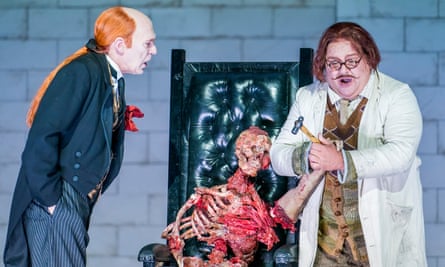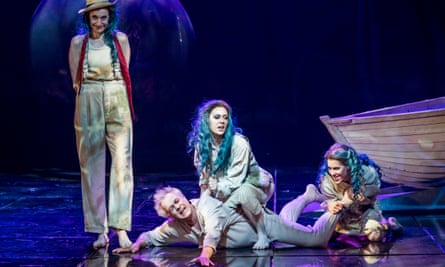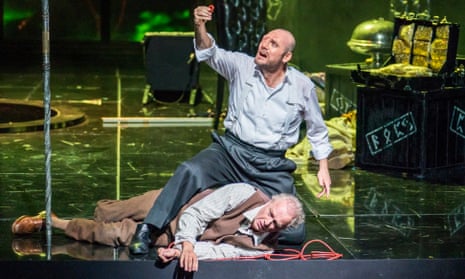Wagner’s Ring cycle is an epic on a scale unmatched elsewhere in opera, but its dramatic progress depends on the power of various mythological bits and pieces. Spear, helmet, sword, ring – as wielded by gods and heroes, and resounding in their musical form as leitmotifs, are the catalysts for four long nights at the opera. In his Royal Opera House production (now back for its third revival, with Antonio Pappano once again in the pit), director Keith Warner supplements Wagner’s symbolic toolkit with additional paraphernalia: Das Rheingold, the Ring’s first instalment, sets up the cycle’s backstory, but unfolds in Warner’s staging like a surreal TV shopping channel, with a flurry of carry cases and rubber fish, loud sartorial detailing and steampunk gadgetry.

Every box of tricks needs a magician and in this case it is Loge, demigod of fire and Wotan’s fixer, whose cunning is remade as a form of prestidigitation and techno-wizardry, performed to an audience of rather slow-witted gods. Slapstick comes as standard in this Valhalla: Freia fawns and pouts idiotically at the giant Fasolt, from whom she supposedly needs to be rescued; her ineffectual brothers, Donner and Froh, are dressed as if they have stepped out of a high-camp Edwardian panto and spend their time striking gallant poses with their weaponry; Fafner, the second giant, is human-sized except for an enormously protruding skull, egg-shaped and protected from the elements by a stovepipe hat, like a cartoon mad scientist. Even down in Nibelheim – here a creepy, dirty-white-tiled chamber where “operations” have been carried out on human bodies living and dead – Alberich plays with a model aeroplane and beats up his brother Mime while invisible (courtesy of that helmet) in a scene of pure physical comedy.
Wagner wasn’t known for his sense of humour and none of this is terribly funny. But his often-infantile characters inject much-needed energy into the proceedings of what even the composer called a “preliminary evening”. In some roles, the slapstick and the voice match: Andrew Staples’ Froh sounds comically underpowered at times, Günther Groissböck’s Fasolt is solid but stiff, and Alan Oke’s Loge narrow-bore and nimble. As the three Rhinemaidens, Lauren Fagan, Christina Bock and Angela Simkin blend beautifully and frolic with ease. Johannes Martin Kränzle is an irresistible Alberich – imagine Marilyn Manson crossed with Thomas Gradgrind – chewing on the German text and expressive to the nastiest outer reaches of his tone.
Elsewhere, though, the rough-and-tumble gags are in stark contrast to the poise and clarity of the musical performances. Thus, Lise Davidsen’s Freia (her much-awaited ROH debut) may look like a simpering bimbo, but the easy stream of vocal power that she summons tells a different story. Sarah Connolly’s long-suffering Fricka sounds a touch autumnal at times, but is all the more sympathetic for it; as her husband, Wotan, John Lundgrenhas a thrilling upper register and a similarly compelling stage presence, though only time will tell how the apparent lack of weight further down works in this hefty role.

Crucial to this sustained meeting of the sublime and the ridiculous is the ROHorchestra under Pappano: burnished brass, finely etched percussion, the strings a vast, perfumed warm bath. From the barely audible opening in an auditorium plunged into total darkness to the score’s euphoric, soaring close, this operatic pantechnicon is driven by Pappano, his sense of pace – and of the bigger picture – unsurpassed.

Comments (…)
Sign in or create your Guardian account to join the discussion